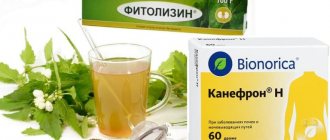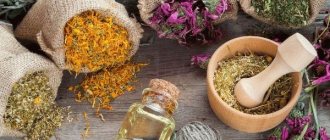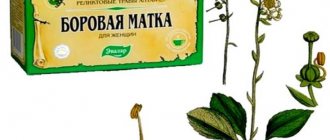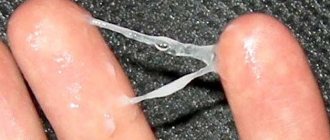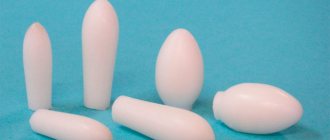Women are much more likely to experience unpleasant symptoms of cystitis. For many, it becomes chronic - due to incorrect diagnosis, untimely and incorrect treatment, and for other reasons. Some people simply don’t want to take the pill again and hope that “it will go away on its own.” But there is another option, less aggressive than pharmacology. Herbs for cystitis in women - how effective they are, how specifically they help, are there any contraindications and hidden dangers of such treatment. The answers to these questions are given below.
Medicinal properties of herbal remedies
Herbs that treat cystitis act in several directions at once:
- have an anti-inflammatory effect;
- have an antimicrobial effect;
- promote the removal of pathogenic bacteria;
- relieve spasms and pain;
- strengthen local immunity.
The best therapeutic effect is provided by herbal preparations, the components of which enhance the effect of each other.
In acute and chronic course of the disease, different herbs are used for cystitis.
Medicinal plants with antibacterial, diuretic and anti-inflammatory effects are intended for oral administration. Traditional medicine also recommends taking medicinal baths with them to relieve symptoms.
General information about cystitis
Cystitis is an infectious and inflammatory disease of the bladder walls. The pathology is typical for women and girls. Particularly common during pregnancy and menopause. The causative agents are pathogenic microflora. Risk factors are physical inactivity, hypothermia, promiscuous sex life, and gynecological diseases. Symptoms:
- discomfort (stinging, burning) when urinating;
- pain in the suprapubic region;
- deterioration of general condition (fever, malaise, nausea);
- change in urine sediment (turbidity, admixture of “flakes”, blood).
The course of cystitis is acute or chronic. Treatment is complex: antimicrobial, anti-inflammatory, detoxification agents, antispasmodics.
List of herbs for cystitis in women
Antibacterial herbs that are highly effective in treating bladder inflammation include:
- goldenrod;
- cowberry;
- bearberry;
- yarrow;
- chamomile;
- juniper.
The following is a list of what herbs to drink for cystitis are intended to have a diuretic effect:
- horsetail;
- bird knotweed;
- plantain.
Many herbal components have a diuretic effect against cystitis in women, but these three herbal remedies have the most powerful effect. Before using the first two of them, you must consult a urologist or nephrologist, since these drugs are highly toxic and have contraindications, including cystitis with blood.
The following herbal remedies used for cystitis and urethritis have a good anti-inflammatory effect:
- linen;
- marshmallow;
- lovage
Herbal preparations help improve local blood circulation, have a regenerating effect on the mucous membrane of the bladder and help strengthen local immunity.
To relieve spasm and pain in complex therapy of bladder inflammation, the following are used:
- Dill seeds;
- tansy;
- immortelle;
- corn silk.
Herbal preparations in this category not only effectively relieve spasms, but also eliminate swelling due to their diuretic effect.
To strengthen the immune system during therapy, it is recommended to take immunostimulating herbs, which include eleutherococcus and ginseng. They contain a large amount of vitamins and other useful substances that help strengthen the body.
What can you replace herbs with?
In addition to herbs, cystitis in women is also treated with tablets and herbal medicines. These include:
These are diuretics, fast-acting drugs with anti-inflammatory and antimicrobial effects. They contain a complex of plant components that are most effective against bladder inflammation. They are often prescribed during pregnancy and breastfeeding, as they are considered the safest.
Herbal medicines are prescribed not only for therapeutic purposes, but also for prophylactic purposes in the chronic course of the disease.
Contraindications to the use of herbal uroseptics include individual intolerance, renal and heart failure.
Despite the natural composition of these medicines, their use must be agreed with your doctor.
It should be remembered that treatment of cystitis without antibiotic therapy in most cases does not give a positive result, since the pathology is most often bacterial in nature. Only an integrated approach to therapy, which consists of taking antibiotics in combination with nitrofurans, diet and herbal medicines, can help cure the disease forever the first time.
Pharmacy fees
The pharmacy offers a wide selection of herbal remedies for cystitis in women. Among them:
- Phytonephrol;
- Cystophyte;
- Herbal collection Baikal No. 9.
The active ingredients of the drug Fitonephrol are medicinal calendula, eleutherococcus, peppermint, bearberry leaves and dill seeds. The herbal medicine has the following therapeutic effect:
- anti-inflammatory;
- antimicrobial;
- diuretic;
- antispasmodic.
The active substances of the herbal collection cleanse the urinary system of pathogenic bacteria that provoke the inflammatory process. The plant components included in the composition contain a large amount of flavonoids, which have an antispasmodic and analgesic effect by relaxing spasmodic muscles. Phytonephrol is prescribed for cystitis, urethritis, urolithiasis and pyelonephritis. Treatment with the drug is carried out for 2-4 weeks.
Proper use of medicinal herbs
Each plant has certain advantages and disadvantages, which characterize contraindications for use. In some cases, they are much more significant than those of artificial medicines. You can prepare herbal decoctions and tinctures yourself, adhering to the following rules:
- familiarize yourself with the features of each component in the recipe;
- explore their ability to increase or decrease the potency of other herbs and medications;
- collect herbs yourself only during the appropriate period of accumulation of healing properties;
- refuse to collect plants in environmentally unfavorable, polluted places;
- create the necessary storage conditions in dryness and darkness;
- prepare decoctions in a thermos or enamel pan;
- store infusions in closed glass containers;
- To prepare alcoholic infusions, use vodka and food-grade ethyl alcohol, excluding the presence of technical liquids.
Preparation of medicinal herbs must be competent
You should not buy plants on the market that are unfamiliar to you with information about delivery from other countries. A wise old doctor said: “To experience the effectiveness of Chinese medicine, you need to be Chinese.”
For ready-made ingredients for a prescription, it is better to contact a pharmacy. Cultivation and production are carried out in environmentally friendly areas, expiration dates are marked on the packaging, the information provided about the indications and brewing method inspires confidence.
Making herbal infusions at home
What herbs to drink for cystitis in women largely depends on the form of the disease. In acute and chronic cases, various medicinal components of plant origin are taken. To prepare medicinal decoctions, you can use both pharmaceutical herbal remedies and herbs collected independently.
In acute illness
In the acute form of the disease, the most effective are:
- corn silk;
- flax seeds;
- Birch buds;
- bearberry;
- chamomile.
Collections are prepared from herbal remedies, and they can also be used separately to prepare decoctions.
Corn silk decoction
The herbal component primarily has an analgesic and antispasmodic effect.
To prepare the drink you will need two tablespoons of the main component and a glass of hot water. The decoction should sit for a couple of hours, after which it can be taken. The product is drunk in small sips throughout the day. The maximum daily dose should not exceed 0.5 liters.
Flax seed decoction
For a liter of water you will need five heaped tablespoons of seeds. The ingredients used are placed in an enamel pan and placed on low heat. The product is boiled for half an hour. The evaporated volume is brought to 1 liter. The resulting broth is allowed to brew for another half hour. The filtered drink is taken half a glass every 2 hours. The course of treatment should not exceed more than one week.
Herbal mixture
Herbs for cystitis in women are most often used in herbs to increase therapeutic effectiveness. A mixture of nettle leaves, juniper, chamomile, cornflowers, flax, calamus and mint has proven itself well. Each of the components is taken in equal parts. Take one tablespoon from the resulting mixture and brew it with a glass of boiling water. After infusing for half an hour, the resulting drink can be taken a third of a glass three times a day. The course of therapy is 1 week.
A herbal mixture of fennel, St. John's wort and corn silk also has a good healing effect. The mixture is prepared in the same way as described above. For a glass of boiling water you will need a tablespoon of the product. After two hours of infusion, the drink is taken one third of a glass three times a day. The duration of treatment is 7-10 days.
How to recognize the disease?
In the acute stage, cystitis occurs rapidly with clearly manifested symptoms. The main signs of the disease include:
- frequent and false urge to urinate. An adult healthy person visits the toilet about 8 times a day;
- difficulty and pain when urinating;
- strong unpleasant odor, dark color of urine. Cystitis is often accompanied by cloudy urine due to the appearance of sediment. In some cases, blood impurities are detected.
False urge to urinate indicates a disease.
Usually, medications are used in the treatment of cystitis, but they have side effects. Herbs can be successfully combined with medications to increase the effectiveness of treatment and strengthen the immune system. It is better to discuss the use of folk remedies with your doctor.
Herbal baths
Treatment of cystitis with herbs in women is carried out not only by taking them orally, but also by using medicinal baths from them. However, many medical specialists are against this method, because they believe that hot and warm baths can lead to complications. Despite this, many women continue to practice this method of treatment, and reviews left claim that herbal baths helped relieve symptoms. Before using this method of therapy, it is still recommended to first consult a urologist.
The following herbal ingredients are used to prepare medicinal baths:
- birch leaves;
- calendula;
- oregano;
- St. John's wort;
- chamomile;
- Bay leaf.
Any of the plant components are brewed in a liter of boiling water in the amount of 5 tablespoons. After two hours of infusion, the resulting infusion is poured into a bath, which is taken for 10 minutes. The decoction can also be used as sitz baths.
This is just a small list of what herbs to treat cystitis in women. In folk medicine, many plant components are used to eliminate the inflammatory process in the bladder.
Types of herbs that have certain properties in the treatment of pathology
The following herbs can have a positive effect in the treatment of cystitis:
- Flax-seed;
- Celandine;
- Ledum;
- Corn silk;
- Echinacea;
- Sage;
- St. John's wort;
- Aloe;
- Rose hip;
- Juniper;
- Calendula;
- Lovage;
- Cowberry;
- Cranberry;
- Oregano;
- Licorice;
- Birch buds;
- Thyme;
- Yarrow;
- Paul has fallen;
- Chamomile;
- Tansy;
- Oats;
- Nettle;
- Parsley;
- Mint;
- Oak bark;
- Sagebrush;
- Bear berries, bear ears or bearberry;
- Linden;
- knotweed;
- Horsetail;
- Elder;
- Raspberries;
- Currant leaves;
- Melissa.
Enveloping
Herbs with an enveloping effect not only eliminate discomfort, but also protect the bladder from infections during the entire treatment period. The main plants with this effect are lingonberry and currant leaves, bear ears, cranberries, chamomile and oak bark.
Healing plants from this group can be taken for more than 7 days in a row. Currants, lingonberries and cranberries can be consumed regularly for prevention in the form of juices and fruit drinks.
Anti-inflammatory
During therapy, medicinal plants with an anti-inflammatory effect are necessarily used. The most commonly used ones include linden, raspberry, currant, oak bark, calendula, string and chamomile. These healing plants quickly stop the inflammatory process and stop it.
Chamomile is an anti-inflammatory herb for cystitis.
Many of the herbs in this group additionally have sedative properties, which allows you to relax and fully relax. However, you should not stop taking them immediately after eliminating the symptoms of the disease. It is recommended to consume such herbs within 7-10 days. They have a cumulative effect and will protect the body during its recovery from illness.
Antiseptic
Herbs that provide quick treatment for cystitis in women are plants that have antiseptic properties. Once in the body, natural antibiotics that are part of medicinal plants actively fight infection. Tannins in their composition stop the spread of the inflammatory process and eliminate the feeling of pain. The main plants that have this effect include:
- Oak bark;
- Licorice;
- Echinacea;
- Cowberry;
- Bearberry;
- Juniper;
- Ledum;
- Currant;
- Cranberry.
Currant and lingonberry leaves are best used when added to tea along with honey. But the herb bearberry, or bear's ears, can be used in combination with any other medicinal plants for cystitis.
Diuretics
For cystitis, herbs with a diuretic effect allow you to quickly flush out toxins from the bladder, help restore the immune system and significantly reduce the number of pathogenic microorganisms. Diuretics also prevent congestion. Thanks to this, the inflammatory process stops and the pain is significantly reduced.
Recipes
Folk remedies for the treatment of acute cystitis are popular among Russians. These include decoctions, infusions and baths.
It is important to remember that healing drinks prepared at home quickly lose their benefits.
They can be stored for no more than 48 hours. Therefore, it is better to brew a fresh portion immediately before use. Some proven recipes are given below.
Decoctions
Bearberry decoction is considered one of the most effective. 2 tbsp. l. Brew the dried plant with a glass of boiling water and put it in a warm and dark place for 12 hours (this can be a simple thermos). Take 1 tbsp decoction. l. after meals four times a day.
Decoctions of lingonberry leaves are excellent for treatment. 1 tsp. Pour 1 cup of boiling water over the plants and leave to brew for 30 minutes. Drink 100 g of decoction three times a day.
Bearberry decoction is considered one of the most effective for cystitis.
Infusions
An indispensable remedy for acute cystitis is an infusion of yarrow. 2 tsp. pour a glass of warm water over the herbs, leave for 1 hour, then strain. Drink 1/4 cup 4 times a day.
Another medicinal drink can be prepared from parsley seeds and bearberry leaves.
First, infuse 1 tbsp in a glass of cold water. l. mixture, then boil for 7-10 minutes, then filter. Drink in small sips throughout the day.
Baths
In addition to drinks, dry warming and wet anti-inflammatory baths based on medicinal herbs are popular. However, these procedures are most effective only as part of complex therapy.
The prepared medicinal solution must be diluted in 200-250 liters of water. The recommended temperature should be on average +37…+37.5°C. The procedure time is about 15-20 minutes.
Baths with a decoction of bay leaves help best with cystitis.
Baths with decoctions help best with cystitis:
- Horsetail. Add 350 g of dried herbs to a five-liter saucepan and brew with boiling water. The solution is infused for 2 hours and filtered. Then pour it into the bath.
- Chamomiles. 100 g of flowers are poured into 2 liters of boiling water and simmered over low heat for 5 minutes. Pour the resulting mixture into the bath, and you can add a few drops of iodine there.
- Bay leaf. Boil 20 g of bay leaf over low heat for 30 minutes. The decoction is diluted in 100 liters of water.
